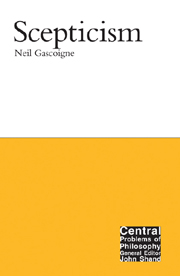6 - Internalisms and externalisms
Summary
Therapy, diagnosis and intuition
We ended Chapter 5 with a contrasting pair of evaluations of the problem of Cartesian scepticism. According to the ‘intuitive’ account of the ‘New Sceptics’ theoretical attitude doubt arises ‘naturally’ as a result of a special sort of reflection on our epistemic concepts. Although it has no effect on the everyday use or application of these concepts, its formal truth nevertheless denies us a fully articulated grasp of what we take to be a central feature of our conceptual scheme: a full-blooded concept of objectivity (of the world being in some respects the way it is independently of our thoughts about it).1 In contrast, on the ‘diagnostic’ account theoretical attitude doubt is what you get when you presuppose a certain sort of theory. Once this theory is exposed, talk of a special sort of reflection is expected to fade and sceptical problems become relics of the past. Both the ‘intuitive’ and the ‘diagnostic’ accounts can be regarded as responses to the perceived failure of the ‘therapeutic’ approach associated with Austin and Wittgenstein. Although they draw contrasting conclusions, both the ‘intuitionist’ and the ‘diagnostician’ regard the ‘therapist’ as having failed satisfactorily to address what we have called the Intuition Problem by dismissing sceptical problems as unreal.
In the foregoing I hope to have shown that this dismissal is premature and that ‘therapeutic’ scepticism is, despite the initial air of paradox, a plausible response to sceptical problems.
- Type
- Chapter
- Information
- Scepticism , pp. 165 - 197Publisher: Acumen PublishingPrint publication year: 2002

